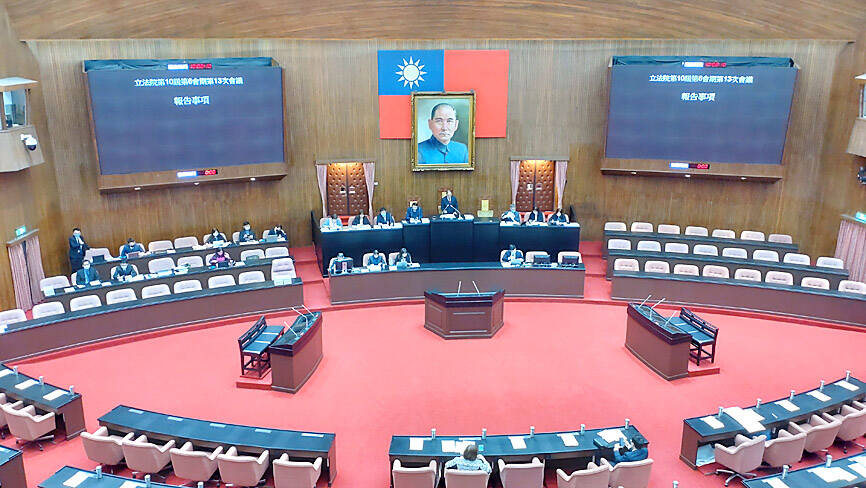Proposals to increase penalties for treason and to bar people with criminal convictions from running for public office were forwarded to legislators yesterday.
An amendment to the Criminal Code of the Armed Forces (陸海空軍刑法) proposed by Democratic Progressive Party (DPP) Legislator Wang Ting-yu (王定宇) would jail people found guilty of treason for 10 years during peacetime and 12 years during wartime.
The proposal has been referred to the legislature’s Foreign Affairs and National Defense Committee.

Photo: Yang Cheng-yu, Taipei Times
Existing laws only provide for the death penalty, a life sentence or a sentence of more than 10 years for those who seek to benefit an enemy or undermine the nation militarily, Wang said, adding that there is no penalty specifically covering collusion to gain non-military benefits.
Wang proposed the changes after former army colonel Hsiang Te-en (向德恩) was found guilty last month of accepting NT$560,000 from China in exchange for signing a “surrender agreement.”
Hsiang was indicted on corruption charges for appearing in a video in which he swore allegiance to the Chinese People’s Liberation Army, promising to act against Taiwan should it invade.
Wang’s proposal includes a clause that states if an individual provides non-military benefits to an enemy and undermines the Republic of China or its allies, they would face three to 10 years in prison, or five to 12 years during wartime.
DPP Legislator Huang Shih-chieh (黃世杰), who is a lawyer, said that the decision by prosecutors to charge Hsiang with corruption stemmed from legal strategy, not a lack of laws against treason.
The penalty for conspiring to commit treason during peacetime is a sentence of three to 10 years, which is lighter than the punishment stipulated for breaching the Anti-Corruption Act (貪污治罪條例), Huang said.
Authorities were not prevented from charging Hsiang with conspiracy to commit treason during peacetime, he said.
Additionally, Executive Yuan-proposed amendments to the Civil Servant Election and Recall Act (公職人員選舉罷免法) and the Presidential and Vice Presidential Election and Recall Act (總統副總統選舉罷免法) were referred to the legislature’s Internal Administration Committee.
The amendments would bar those convicted of treason, bribery, or trafficking of drugs or firearms from being nominated for election to public office.
Also yesterday, the Legislative Yuan approved the third reading of a proposed amendment to the Commodity Tax Act (貨物稅條例), extending until 2026 a program to subsidize commodity taxes up to NT$400,000 for owners of large diesel trucks who switch to newer vehicles.
The project, enacted in 2017, seeks to encourage owners of diesel trucks to buy newer vehicles to improve air quality.
The original plan ends on Saturday next week.
Additional reporting by Wang Chien-hao

The Chinese Communist Party (CCP) is pushing for residents of Kinmen and Lienchiang counties to acquire Chinese ID cards in a bid to “blur national identities,” a source said. The efforts are part of China’s promotion of a “Kinmen-Xiamen twin-city living sphere, including a cross-strait integration pilot zone in China’s Fujian Province,” the source said. “The CCP is already treating residents of these outlying islands as Chinese citizens. It has also intensified its ‘united front’ efforts and infiltration of those islands,” the source said. “There is increasing evidence of espionage in Kinmen, particularly of Taiwanese military personnel being recruited by the

ENTERTAINERS IN CHINA: Taiwanese generally back the government being firm on infiltration and ‘united front’ work,’ the Asia-Pacific Elite Interchange Association said Most people support the government probing Taiwanese entertainers for allegedly “amplifying” the Chinese Communist Party’s propaganda, a survey conducted by the Asia-Pacific Elite Interchange Association showed on Friday. Public support stood at 56.4 percent for action by the Mainland Affairs Council and the Ministry of Culture to enhance scrutiny on Taiwanese performers and artists who have developed careers in China while allegedly adhering to the narrative of Beijing’s propaganda that denigrates or harms Taiwanese sovereignty, the poll showed. Thirty-three percent did not support the action, it showed. The poll showed that 51.5 percent of respondents supported the government’s investigation into Taiwanese who have

Left-Handed Girl (左撇子女孩), a film by Taiwanese director Tsou Shih-ching (鄒時擎) and cowritten by Oscar-winning director Sean Baker, won the Gan Foundation Award for Distribution at the Cannes Critics’ Week on Wednesday. The award, which includes a 20,000 euro (US$22,656) prize, is intended to support the French release of a first or second feature film by a new director. According to Critics’ Week, the prize would go to the film’s French distributor, Le Pacte. "A melodrama full of twists and turns, Left-Handed Girl retraces the daily life of a single mother and her two daughters in Taipei, combining the irresistible charm of

South Korean K-pop girl group Blackpink are to make Kaohsiung the first stop on their Asia tour when they perform at Kaohsiung National Stadium on Oct. 18 and 19, the event organizer said yesterday. The upcoming performances will also make Blackpink the first girl group ever to perform twice at the stadium. It will be the group’s third visit to Taiwan to stage a concert. The last time Blackpink held a concert in the city was in March 2023. Their first concert in Taiwan was on March 3, 2019, at NTSU Arena (Linkou Arena). The group’s 2022-2023 “Born Pink” tour set a